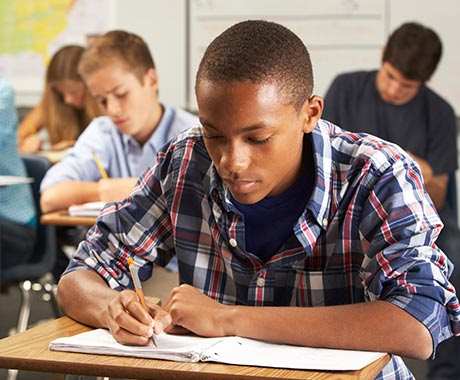Story Highlights
- During the coronavirus era, students are at risk for mental health challenges
- The need to pause and reset while facing loneliness is crucial
- Caring communication is key to student wellbeing during COVID-19
While mental health challenges aren't new to higher education by any means, COVID-19 has suddenly amplified these concerns due to a whole new and unprecedented level of student isolation and life disruption.
Gallup research finds that in the U.S., life ratings have plummeted to a 12-year low -- the percentage of U.S. adults who evaluate their lives well enough to be considered "thriving" has dropped to 48.8%, the lowest level since 2008.
Though our understanding of the emotional impact of COVID-19 won't be known for years, the existing college student mental health statistics were already challenging leaders.
Nearly 45% of college students were treated for depression or anxiety within the last year, according to one study. This sobering trend is felt by education leaders across the country, as 72% of college presidents have "reallocated or identified additional funding to address the issue."
And chief student affairs officers recently ranked student mental health as their top concern, according to Inside Higher Ed and a concern that leaders can't lose sight of in the drastic shift to online education, as necessitated by this crisis.
How to Care for Your Students While They Are Learning Remotely
Yet today, social distancing is the new reality of education and our culture at large. In a Gallup poll conducted in the first week of April, three in four Americans say they have completely (28%) or mostly (47%) isolated themselves from people outside their household. Students are adjusting overnight to new methods of learning, new methods of staying in touch with their friends and teachers, and also to unprecedented amounts of time spent in close contact with their families. These changes can lead some students to feel overwhelmed and helpless.
Isolation links to loneliness and a heightened possibility of problematic levels of loneliness. The struggles for students are a real and constant concern. Even during our prior "normal," a 2019 study of young Australians found "more than one in three young adults (aged 18-25) reported feeling alone either sometimes or always" according to the study from Swinburne University and VicHealth.
Dr. Michael Osterholm, director of the Center for Infectious Disease Research and Policy at the University of Minnesota, says that we as a society, "...can't shelter in place for 18 months. This isn't going to work. How are we going to start dealing with both the hearts and the heads of the citizens of this country, and for that matter the world? And, we have to understand it's going to be more than just giving them factual data or information. This is where leadership is really key."
By making an extra effort to care for your students and take an interest in whether and how they are thriving, you'll be able to help them overcome this hurdle in life-changing ways.
Pause and Reset Time Is More Crucial Than Ever
Now that students lack the ability to connect with roommates, receive mentoring from student advisers, and feel more connected to the school through participating in student organizations, the need to help them pause and reset is more vital than ever. "All of that has come to a stop, which, of course, has a big effect on the economy but also forces us to ask how we can be healthy and happy as life goes on," Deepak Chopra says.
As Harvard professor and Gallup Senior Scientist Arthur Brooks reminds us, "social connectedness is central to wellbeing and good mental health." He continues, "…when we are isolated from others and thus bereft of oxytocin, life can feel cold and empty. For many, loneliness and even depression follow. Today's regime of social distancing may well spare us from COVID-19 infection. But if it continues too long and without remediation efforts, it will also deprive us of the oxytocin [a highly pleasurable neurotransmitter] we need to survive and thrive."
"How are we going to start dealing with both the hearts and the heads of the citizens of this country, and for that matter the world?"
There is no single solution to mental health challenges on campus and especially not when facing a pandemic. In 2017, Gallup partnered with Strada Education Network to identify the precise experiences students have on campus that relate to high levels of wellbeing using survey responses from more than 30,000 college graduates nationally. First, Gallup measured the extent to which students were thriving in their overall wellbeing, and then the extent to which these students were thriving in each of five wellbeing elements -- purpose, financial, social, community and physical wellbeing. Gallup identified a series of 10 high-impact experiences that affected the extent to which students thrived in their wellbeing, and the top three influencers are vital for staff and/or faculty to focus on in this new chapter of life:
- At [my school], I have the opportunity to do what I do best every day.
- I feel safe at [my school].
- Students at [my school] look out for one another.
Feeling safe "at my school" means something radically different today than it did before -- what students experience now is like no other time in history, and education leaders must lead and teach from a caring perspective. A student who is known by name and who feels cared for by professors will feel less isolated. Plus, leaders who model a caring relationship for their students will foster stronger relationships among students' peers.
Face-Time Provides Valuable Connection
How can professors do this? Start by getting students on video conference as much as possible. Look them in the eye and use their name while distance learning. Create partnerships and group activities where students are encouraged to be on video with one another. Finally, start classes with authentic care for your students by checking in with them to see how they are processing things. While such moments don't replace human touch and presence, those loving moments have never been more vital.
Feeling safe "at my school" means something radically different today than it did before -- what students experience now is like no other time in history, and education leaders must lead and teach from a caring perspective.
Love your students where they are and just listen. The importance of authentic, caring mentors to drive student wellbeing has never been more evident. They will be angry, scared and struggling to feel safe. The world is full of messaging about what's wrong, and students are struggling to see what's right, not simply in the world at large, but in themselves, too. This modest shift in your mindset is vital to help shift your students' mindsets, too.
Ask your students questions to understand how they are doing in their personal wellbeing -- are they thriving, struggling or suffering? How are their relationships with friends, family and the broader campus? Where are they at financially? How about in school and future career thinking? How are they staying physically healthy? By being a mentor who sees their individual strengths, you can reduce their sense of isolation and empower them to build a future during these uncertain times. And that just might make all the difference during a time when they need you most.
To help better connect with your students during COVID-19, begin by learning more about the power of strengths-based development:
- Learn how focusing strengths on measurable outcomes will profoundly influence student wellbeing and engagement in this new two-day virtual course for campus advisers.
- Read our perspective paper to learn the three fundamental steps critical to the success of your CliftonStrengths for Students initiative.
- Discover action items within this book that you can share with your students to inspire them to thrive during this time of virtual learning.






